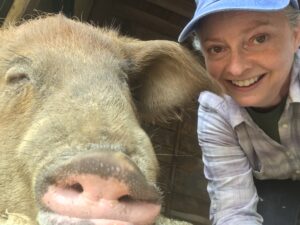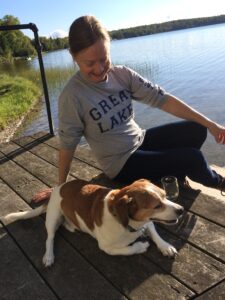In April, a talented new staff member joined the Nonhuman Rights Project: Jennifer Brunk. Jennifer is our Development Director, leading our efforts to secure funds to help the NhRP steadily grow as an organization, which in turn allows us to exponentially extend our reach and deepen our impact. Jennifer has dedicated her career to animal rights and welfare, serving as a Development Director and Executive Director for organizations in the animal advocacy movement for over two decades. When she’s not working, she enjoys kayaking, canoeing, and stand-up paddle boarding on the many lakes and rivers in Michigan, where she’s based.
I talked to Jennifer about why she’s in this fight, how she thinks about the nonhuman animal rights movement, and more:
Why are you looking forward to being part of the NhRP, and why do you think nonhuman rights are important?
Jennifer: I’m thrilled to join the exceptional team at the NhRP! This role presents an opportunity to contribute to profound, life-changing advancements in nonhuman rights. I believe nonhuman rights are crucial as they affirm the inherent value and dignity of all beings. Advocating for nonhuman rights involves challenging entrenched beliefs about human superiority and reevaluating our relationship with other species, and I’m passionate about the immense moral, social, and environmental benefits that can result from it.

What excites you about this juncture in the fight for nonhuman rights? What gives you hope and keeps you going despite the obstacles we face?
Jennifer: I’m excited about this juncture in the fight for nonhuman rights because I see a growing awareness and momentum toward recognizing the personhood of nonhuman animals. Despite the obstacles, what gives me hope is seeing the dedication and passion of my colleagues at the NhRP who are building on Steve Wise’s legacy by tirelessly working to secure rights for nonhuman animals.
What do you think a future that includes nonhuman rights looks like, and what do you think it will take to get there?
Jennifer: I’m passionate about a future where nonhuman rights are integral to a more compassionate and just world. I envision a future where ethical considerations extend to all animals, transcending species boundaries. Achieving this vision requires a profound shift in our moral framework and legal systems to recognize the moral imperative of extending rights to nonhuman animals.
We need persistence and determination to reshape our society’s moral framework, legal systems, and culturally ingrained attitudes. Litigation, legislation, and education will play crucial roles in driving this change. While this transformation will be hard won, I have no doubt we’ll progress towards a future where the human relationship with other animals is defined by justice, equity, respect, and compassion.

The fight for human rights is far from over, and climate change is an existential threat to all life on earth. How do you think it helps human beings and the planet to recognize and protect the rights of nonhuman animals?
Jennifer: Recognizing and protecting the legal rights of nonhuman animals could be a powerful tool in our fight against climate change. By doing so, we’d be able to ensure the safeguarding of their habitats and ecosystems, which are crucial for absorbing and storing carbon dioxide. Additionally, granting them legal rights would open the door to challenging harmful activities in court, such as the destruction of their habitats or pollution that impacts human and nonhuman animals and contributes to climate change. This legal recognition could also drive a shift towards more sustainable practices, as we’d be compelled to consider the impact of our actions on sentient beings and their environments. Ultimately, integrating nonhuman rights into our legal systems could lead to more comprehensive and effective strategies for tackling climate change.
How and why did you come to care about nonhuman animals and nonhuman rights?
Jennifer: I’ve always cared about nonhuman animals. I chose to become a vegetarian in my youth, guided by values of compassion and nonviolence. My dedication to nonhuman rights deepened through volunteering and working at humane societies and animal sanctuaries. Witnessing the intelligence, emotions, and social interactions of animals firsthand, along with learning about the widespread ethical and environmental implications of animal exploitation, solidified my commitment. These experiences inspired me to adopt a vegan lifestyle and have profoundly shaped my worldview. I am dedicated to advocating for the rights and well-being of all animals.
Thank you Jennifer for all you’ve done to help nonhuman animals. We’re so glad to have you here!